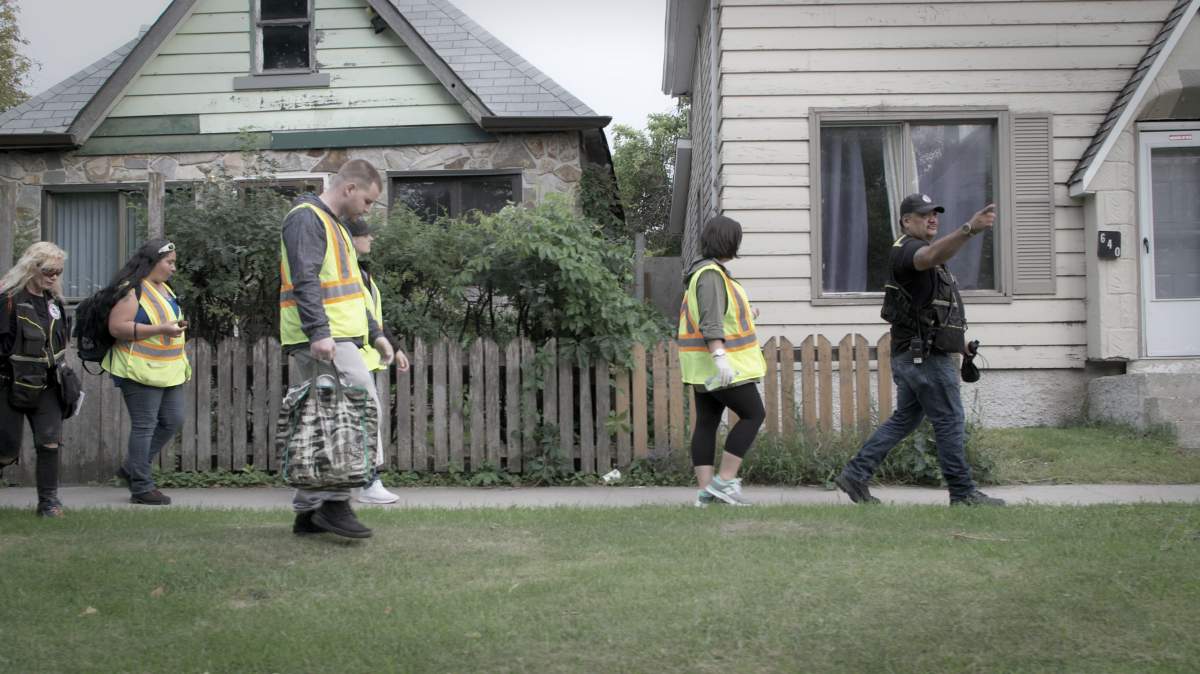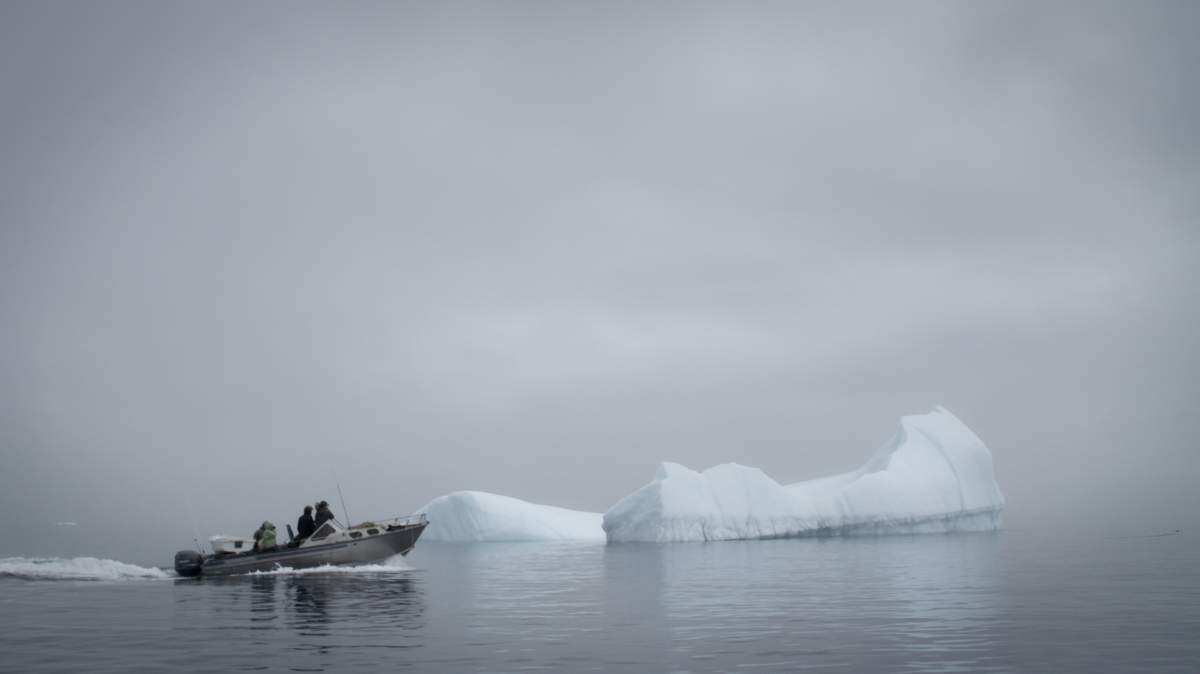First Contact is a new TV docuseries that takes six Canadians — all with strong (and mostly negative) opinions about Indigenous people — on a journey that promises to turn their lives upside down, challenging their perceptions and confronting their prejudices about a world they never imagined they would see.

The series, narrated by George Stroumboulopoulos, documents the journey of six non-Indigenous Canadians as they confront their preconceived notions about Indigenous people during a 28-day journey deep into Indigenous communities across the country.
READ MORE: Joe Zee, Vanessa Craft and Kim Cloutier talk new fashion competition series, ‘Stitched’
First Contact is a three-part docuseries airing on Aboriginal Peoples Television Network (APTN), premiering Part 1 on Tuesday, Sept. 11, Part 2 on Wednesday, Sept. 12 and Part 3 on Thursday, Sept. 13.
With First Contact, APTN hopes to inspire greater awareness of the history and current lives of Indigenous Peoples across Canada, encouraging dialogue and engagement around Indigenous issues.
Global News spoke to Vanessa Loewen, executive producer of First Contact Canada and Jeff Newman, executive writer and director of First Contact Canada, about the new series.
READ MORE: The launch of the Indigenous Peoples Atlas of Canada
- Robert De Niro recites Abraham Lincoln’s warning call for ‘civility’ at Carnegie Hall
- Justin Timberlake sues to block unseen bodycam footage from 2024 DWI arrest
- ‘Evil Dead’ star Bruce Campbell says he has ‘treatable,’ not ‘curable’ cancer
- Creator of Tilly Norwood, AI-generated ‘actor,’ launching the ‘Tillyverse’
Global News: Can you explain the new series and what it entails?
Vanessa Loewen: It’s a three-part documentary series where we have taken six non-Indigenous Canadians, with strong opinions about Indigenous Canada, and we take them on a tour across the country so they can see parts of Canada that they’ve never seen before and never had the opportunity to learn more about. It’s based on an Australian show, of the same name, that was broadcast in 2014. That show came out of a study that was done which indicated that only 1 in 6 non-Indigenous Australians had ever had contact with Indigenous Australians, and they wanted to change that statistic by taking people into Indigenous Australia and having the opportunity to possibly have some of their preconceptions challenged about the community.
I saw that trailer back in 2014 and I felt inspired and excited because I felt like in Canada, we were ready for a show of this nature.
Was there any pushback from the network because of how raw the show is?
VL: I think outside of APTN, there was some pushback. We had a hard time finding a second home for the show. I knew APTN would be a good home for the show and I was fairly confident that they would get on board quickly and continue to support the show. Other broadcasters definitely were not into it. We didn’t find another broadcaster until we were able to get TVO, and we’re very thrilled that they are working with us and we’re really happy with the position they took, which was really to let us guide them in telling this story. The messaging we got as we were going around pitching the show, people didn’t want to do it.
No one in this country would have taken this show based on the experience of pitching it. APTN was the originally the only home for this so this is an opportunity for Canadians to see the role that APTN serves. This story wouldn’t have even gotten out there if we didn’t have APTN.
READ MORE: Geoffrey Owens, shamed ‘Cosby Show’ actor, offered job by Tyler Perry

Get daily National news
How was the selection process for the six non-Indigenous Canadians with such strong opinions?
VL: We were looking for Canadians with strong opinions, a sense of adventure and who were open to learning about their country. You sort of focus on people who share their ideas.
Jeff Newman: They were given a whole range of questions and topics to share their opinions on. Obviously, we wanted people to share their honest opinions and not try to tell us what we wanted to hear in terms of trying to get on the show. So really, they had no idea what we were doing and what we were looking for. The people that ended up getting selected originally had no idea what the concept was or what we were looking for in terms of what they were supposed to bring to the show.
VL: But to be clear, before they went on the journey, they did know what was happening. Once they got to the final leg of the casting, they were aware of what the subject matter of the show was.
Where was this series filmed?
JN: We spanned all across the country. We spent time in Ontario, Manitoba, Alberta, British Columbia and Baffin Island. We filmed in all sorts of types of communities, we were in cities and some fly-in communities. One community was boat access only. So we were in a whole range of different communities across Canada.
Did you see any noticeable change in their behaviour during the filming process?
VL: That’s why people should tune in. My feeling as an Indigenous producer is that we would not be serving our community if we didn’t have people we were hopeful could make a change. The goal is to continue taking steps towards reconciliation so certainly there were people in the group that we were hopeful would come around because that’s the goal. We don’t want to keep perpetuating these ideas. We want to have an opportunity to show these ideas can change minds.
JN: I agree. You can’t go on a 28-day journey through these communities and meet people and not be profoundly affected in one way or another. It was up to them in terms of how they would react and what they would do with the new information that they would collect and the people they would meet and the experiences that would be shared with them. It was such a unique experience to be a part of. I think they all really felt that in their own way.
LISTEN: Ross Jackson joins The Morning News to discuss his experiences with and education from being on First Contact
What were some of the activities the participants had to do during filming? I know you can’t reveal them all but can you mention a few?
JN: We did go up north and they participated in a hunt. The bulk of the show is not adventure-based like a lot of programming you’d expect. The heart of the show is built around listening and sitting down and having conversations between two different worlds that don’t usually sit down across from each other and share and talk. They did other things like attending a pow wow, they participated in some ceremonial activities and went on a traditional hunt. So there is a lot of different elements that went into it but it was really the simple communication where the best moments come from.
What do you hope people take away from watching the series?
VL: I think we’re hoping to contribute to steps towards reconciliation. I’ve said before that in the four years since I watched the Australian version and now we’re able to produce the Canadian version, a lot has continued to happen in the community and in this country in terms of the relationship between Indigenous Canadians and Canadians. I think a good way to conduct the divisiveness of some of the issues and separation is to educate and to have dialogue and to take down the barriers that are between the two communities. I hope this show is another important piece in the machine to get us to a better place.
JN: I hope we can reach an audience that isn’t really aware of what they don’t know about Indigenous culture and the Indigenous story here in Canada. I hope that this has the potential to connect and resonate with that audience in a different way. I hope it’s successful in doing that because it’s so important to get the right information out there about what Canada doesn’t talk about, and what so few Canadians know about which is our real history with Indigenous people in this country. It’s time people are really made aware of what that story is.
Do you think there will be a second season?
VL: APTN has greenlit Season 2 and Jeff actually just got home last Monday from filming it. So yes!
‘First Contact’ premieres on APTN with Part 1 premiering on Tuesday, Sept. 11, Part 2 on Wednesday, Sept. 12, and Part 3 on Thursday, Sept. 13.
‘First Contact’ will be available for online viewing as of Sept. 17, at www.aptn.ca/firstcontact.










Comments
Want to discuss? Please read our Commenting Policy first.